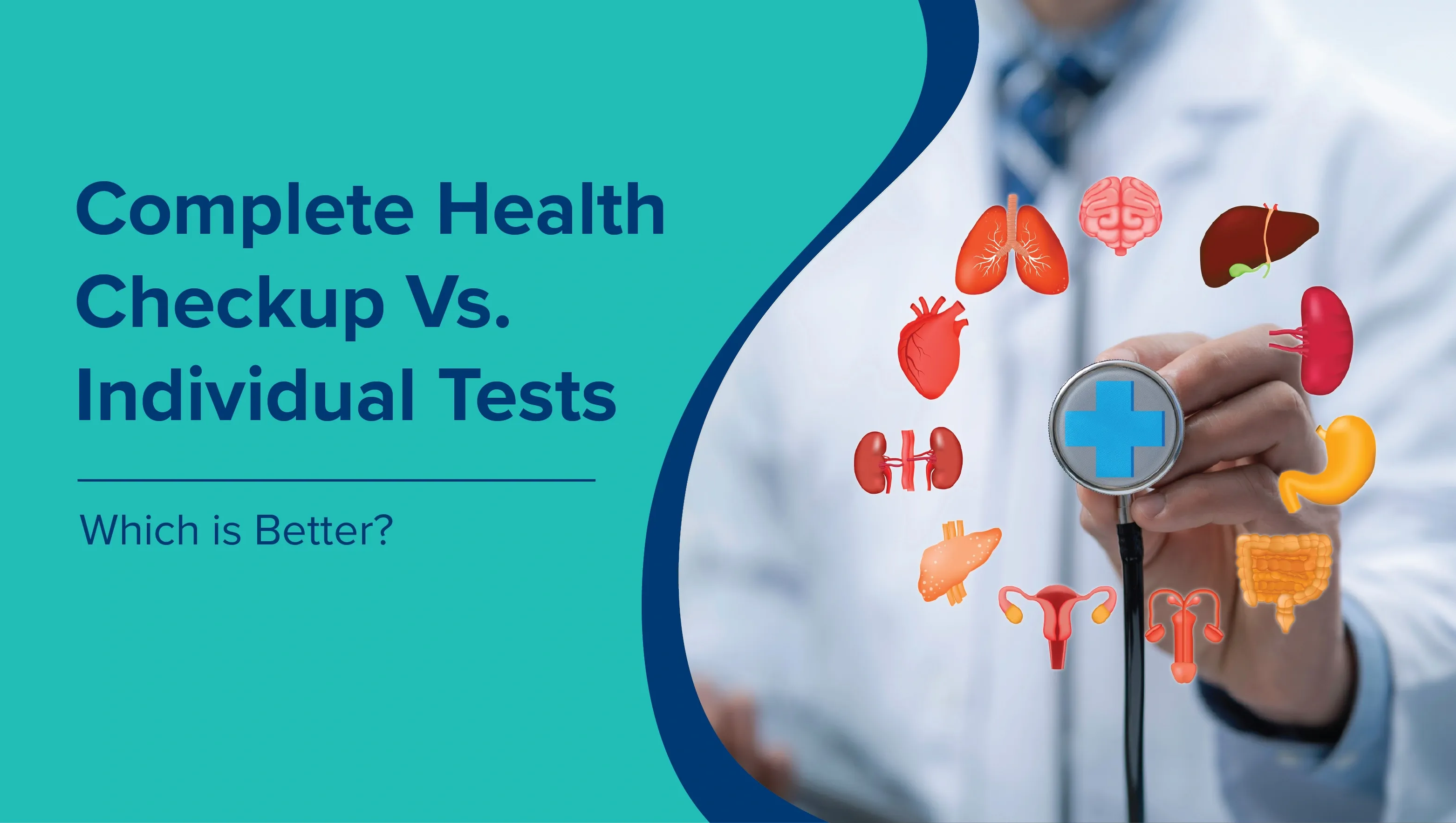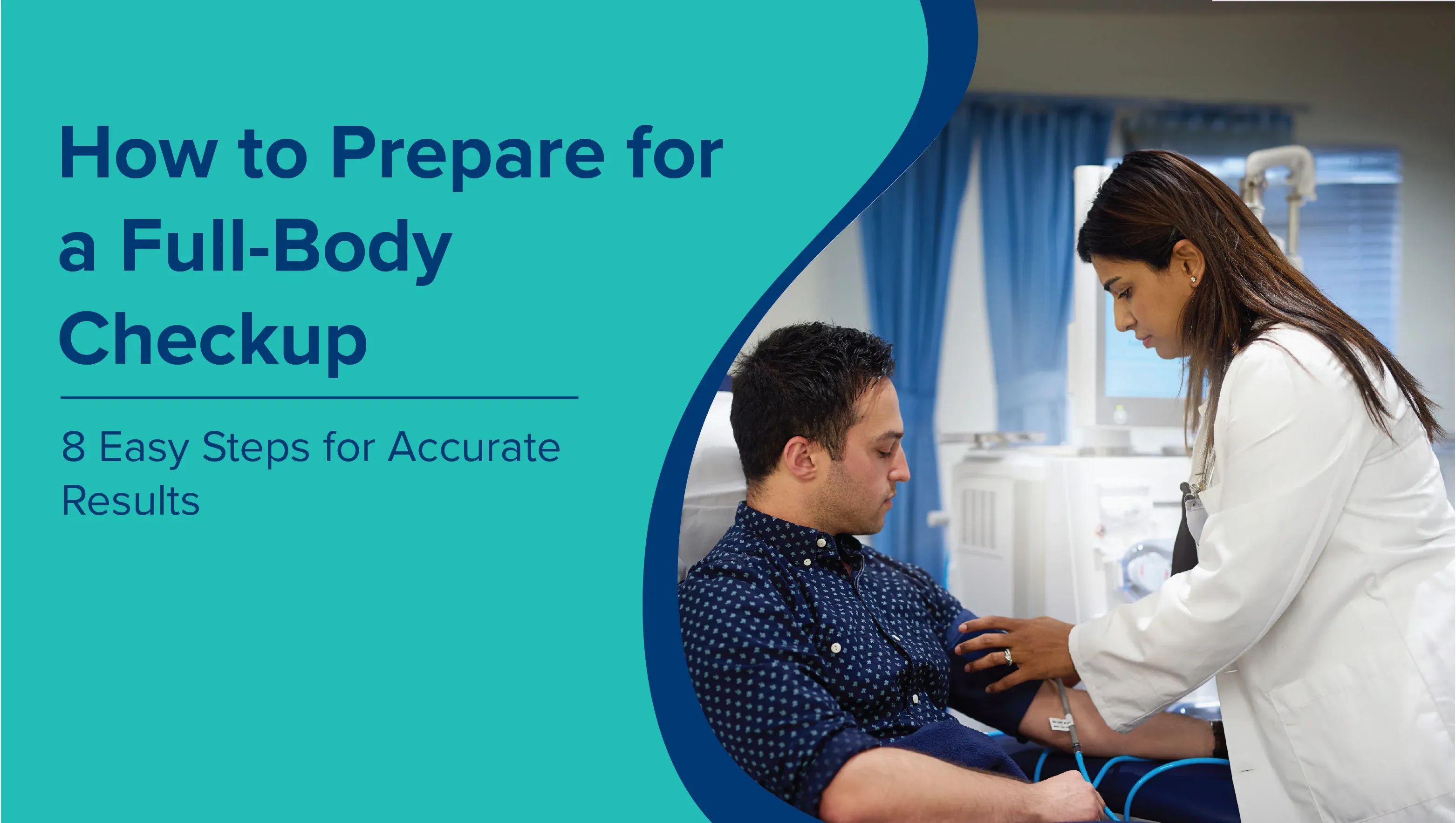In the modern world, the cases of lifestyle-related diseases are increasing rapidly due to factors such as stress, poor dietary choices, and limited physical activity. Moreover, medical conditions such as diabetes, hypertension, and thyroid disorders often develop silently without early warning signs, making regular health screening all the more important. When it comes to monitoring health, two approaches are common: a complete health checkup and individual diagnostic tests. While both options play an important role in preventive healthcare, they differ in their overall purpose and benefits. In this article, we will explore what a complete health checkup includes, how it compares with individual tests, and which option may be more suitable based on age, lifestyle, and overall health needs.
What is a Complete Health Checkup?
A complete health checkup, also known as a full body checkup or whole body checkup, is a set of diagnostic tests conducted together to assess overall health. Instead of focusing on a single condition, this package evaluates multiple organs and systems in the body to detect early signs of disease and assess risk factors. Most complete health checkup packages include commonly recommended tests such as:
-
CBC (Complete Blood Count): Evaluates blood health and detects infections or anaemia.
-
Lipid Profile Test: Measures cholesterol and triglycerides to assess heart health.
-
Thyroid Test (T3, T4, TSH): Screens for thyroid imbalances.
-
Vitamin D Test: Checks for deficiencies that affect bone strength and immunity.
-
Liver and Kidney Function Tests: Monitor vital organ health.
-
Blood Sugar Tests: Help detect diabetes and prediabetes.
What are Individual Diagnostic Tests?
Individual diagnostic tests are specific medical tests recommended by doctors to evaluate a particular health concern or symptom. Unlike a complete health checkup, these tests are focused and targeted, helping confirm or rule out a suspected condition.
Some common examples include:
-
Thyroid Test: Advised when symptoms such as unexplained weight changes, fatigue, or hair loss are present.
-
CBC (Complete Blood Count): Often prescribed if there are signs of infection, weakness, or suspected anaemia.
-
Vitamin D Test: Recommended for bone pain, frequent fatigue, or suspected deficiency.
-
Lipid Profile Test: Ordered when cholesterol imbalance or heart risk is suspected.
-
Blood Sugar Test: Used to diagnose or monitor diabetes.
Who Should Consider a Full Body Checkup?
A full body checkup is not limited to those with existing health concerns; it can benefit a wide range of individuals. Some groups, however, stand to gain the most from full body checkup, as regular screening helps detect hidden conditions early and supports timely preventive care. Below are the categories of people for whom a complete health checkup is especially recommended:
-
Young Adults Over 20: Even in the absence of symptoms, baseline tests help establish a record for future comparison.
-
Individuals with Existing Health Conditions: People with diabetes, hypertension, thyroid issues, or heart disease require regular monitoring.
-
People with Obesity or Sedentary Lifestyle: Extra weight and lack of physical activity increase the risk of metabolic and cardiac disorders.
-
Family History of Chronic Diseases: Those with close relatives suffering from diabetes, cancer, or heart problems should undergo regular screenings.
-
Occupational Hazards (e.g., stress, exposure, long hours): Jobs with high stress, irregular hours, or exposure to chemicals make regular monitoring essential.
-
Individuals with Substance Use or Addictions: Smoking, alcohol, or other substance use raises the risk of liver, lung, and heart conditions.
-
Health-Conscious Individuals Seeking Preventive Care: Those who prioritise wellness can use regular checkups to maintain a healthy lifestyle.
Complete Health Checkup vs. Individual Tests: Key Differences
While both approaches are important in healthcare, they serve different purposes. A complete health checkup gives a broad overview of overall wellness, whereas individual tests are used for focused evaluation of specific issues.
|
Aspect |
Complete Health Checkup |
Individual Tests |
|
Purpose |
Preventive, detects hidden conditions |
Diagnostic, confirms specific health concerns |
|
Scope |
Covers multiple organs and systems |
Focused on one organ/system at a time |
|
When Used |
For early detection and preventive care |
When symptoms or risk factors are present |
|
Convenience |
All tests done in one go |
May require multiple visits for different tests |
|
Cost |
Higher upfront cost, but economical in the long run |
Cheaper if only one test is needed |
|
Outcome |
Comprehensive health assessment |
Narrow, symptom-specific results |
Pros and Cons of a Complete Health Checkup
A complete body checkup offers a wide range of benefits, but it may not be the ideal choice for everyone. Looking at both sides helps in making an informed decision.
Advantages
-
Detects Hidden or Asymptomatic Conditions Early: Many diseases such as diabetes, hypertension, and thyroid disorders show no early signs. Regular checkups can reveal these before complications arise.
-
Cost-Effective in the Long Run: Though the initial package may seem expensive, it reduces the need for multiple separate tests and hospital visits later.
-
Saves Time: Instead of scheduling different appointments for each test, everything is completed in a single package.
-
Helps Monitor Lifestyle and Chronic Risk Factors: A full checkup provides trends over time, making it easier to track the impact of diet, exercise, or medication on health.
Limitations
-
Higher Upfront Cost: Compared to one or two individual tests, a complete checkup requires a bigger initial expense.
-
May Include Tests Not Relevant to Everyone: Some tests in a package may not apply to young, healthy individuals, leading to unnecessary screening.
-
Not Necessary for Young, Healthy Individuals: If there are no symptoms or risk factors, individual tests as per doctor’s advice may be sufficient.
Pros and Cons of Individual Tests
Individual diagnostic tests are highly targeted and useful, but they also come with certain drawbacks when compared to complete health checkups.
Advantages
-
More Focused and Targeted: These tests are ordered to investigate specific symptoms or conditions, ensuring precise results.
-
Doctor-Directed Based on Symptoms: Physicians recommend individual tests after evaluating health history and clinical signs, making them highly relevant.
-
Cheaper if Only One Condition Is Suspected: If the concern is limited to one issue, such as thyroid imbalance or vitamin deficiency, a single test is more affordable.
Limitations
-
May Miss Underlying or Related Health Issues: Since the scope is narrow, other silent conditions may go undetected.
-
Can Lead to Multiple Visits and Delays in Diagnosis: If new symptoms appear, more tests may be needed, increasing time and effort.
-
Not Preventive in Nature: These tests usually focus on existing health concerns rather than predicting future risks.
When to Choose a Complete Health Checkup
Opting for a complete health checkup is the right choice when the goal is prevention and early detection rather than just addressing symptoms. It is especially useful in the following situations:
-
Annual or Preventive Screening: Ideal for those who wish to monitor overall health regularly, particularly after the age of 30.
-
Lifestyle-Related Risks: Beneficial for individuals with sedentary routines, high stress, or unhealthy dietary patterns.
-
Family History of Chronic Diseases: Important for those with relatives suffering from diabetes, heart disease, or cancer.
-
Long-Term Medication Use: People on continuous medication for conditions such as hypertension or thyroid disease may need periodic full evaluations.
-
Corporate and Busy Professionals: Saves time by conducting multiple tests in one sitting without repeated hospital visits.
When to Choose Individual Tests
Individual tests are most appropriate when there is a clear medical concern or a doctor recommends specific investigations. They are best suited in the following scenarios:
-
Symptom-Based Testing: When issues such as fatigue, unexplained weight changes, or persistent cough arise, doctors may suggest targeted tests like thyroid or CBC.
-
Follow-Up Monitoring: Individuals already diagnosed with a condition such as diabetes or high cholesterol often require regular single tests to track progress.
-
Doctor’s Prescription: If a physician suspects a particular illness, ordering one or two specific tests helps confirm the diagnosis.
-
Budget-Conscious Situations: When only one condition is suspected, individual tests are more cost-effective than a full package.
-
Young and Healthy Individuals: Those without family history or risk factors may only need individual tests when required.
Which Is More Cost-Effective in the Long Run?
At first glance, individual tests may appear cheaper since they focus on a single health concern. However, when multiple tests are needed over time, the costs can quickly add up. Each separate test may also involve consultation fees, sample collection charges, and multiple visits, making the overall expense higher.
In contrast, a complete health checkup covers several tests in one package, often at a discounted bundled price. This not only reduces repeated costs but also saves time and effort. For individuals above 30, or those with risk factors such as obesity, family history, or chronic conditions, investing in a complete body checkup proves more economical and practical in the long run.
How Often Should You Get a Complete Health Checkup?
The frequency of a complete body checkup depends on age, lifestyle, and medical history. In general, health experts recommend a complete health checkup for:
-
Ages 20–30: Once every 2–3 years if healthy and without family history of chronic illness.
-
Ages 30–40: Every 1–2 years, especially for those with sedentary lifestyles, stress, or minor risk factors.
-
Above 40: Annually, as risks of diabetes, hypertension, and heart disease increase with age.
-
People with Chronic Conditions: More frequent monitoring as advised by a doctor to track ongoing treatment.
How to Choose the Right Health Package for You
Selecting the right health checkup package depends on personal health needs, risk factors, and lifestyle. Instead of opting for the most extensive package, it is better to choose one that suits individual requirements.
Key factors to consider include:
-
Age: Younger individuals may need only basic blood, sugar, and cholesterol tests, while older adults benefit from more detailed screenings such as cardiac and hormonal evaluations.
-
Gender: Some tests are gender-specific, such as mammography for women and prostate screening for men.
-
Medical History: People with diabetes, hypertension, or thyroid disorders should choose packages that monitor these conditions.
-
Lifestyle: Sedentary professionals, smokers, or those with high stress should opt for comprehensive packages covering cardiac and metabolic health.
Customisation of Health Checkup Packages
Many diagnostic providers, including MaxAtHome, offer fixed wellness packages that cover a set of essential tests, but additional tests can be included during the booking process if needed. The service also provides tiered health packages with varying numbers of parameters, allowing individuals to choose between basic and more advanced options. This flexibility ensures that health checkups remain relevant, practical, and aligned with personal health requirements.
Conclusion
While both complete health checkups and individual diagnostic tests play important roles in maintaining good health - a complete checkup is best for preventive care, early detection, and long-term cost savings, especially for individuals above 30 or those with risk factors. On the other hand, individual tests are more suitable for addressing specific symptoms or for follow-up monitoring of existing conditions. The choice depends on personal health goals, age, lifestyle, and medical history. For those aiming at prevention and overall wellness, a full body checkup is the ideal approach, while targeted tests are more practical for symptom-based concerns.
To make the process easier, MaxAtHome provides comprehensive health checkup packages as well as individual tests - all with home sample collection, expert accuracy, and digital reports. To book a test at home, call 9240299624 or schedule the test online through our easy-to-use booking platform.
Frequently Asked Questions (FAQs)
Is a health checkup necessary every year?
Annual health checkups are recommended after the age of 30 or earlier if risk factors such as obesity, family history, or chronic illness are present.
Which is cheaper: full body checkup or separate tests?
If only one or two tests are needed, individual tests are cheaper. However, for long-term monitoring and preventive care, a complete body checkup is more cost-effective.
Can I book a full body test at home?
Yes, MaxAtHome offers full body checkup at home services in multiple Indian cities, with trained professionals collecting samples from home.
What age should I start preventive checkups?
Preventive checkups are useful from the early 20s onwards, but become more important after 30, when risks for diabetes, heart disease, and lifestyle-related conditions increase.
Do health checkups cover vitamin and thyroid tests?
Most comprehensive packages include Vitamin D and thyroid tests, along with CBC, lipid profile, and sugar tests.
How long does a health checkup take?
Sample collection usually takes 15–20 minutes, and digital reports are typically available within 24–48 hours depending on the package.
Can I customise my health checkup package?
Yes, packages can often be customised to include tests based on age, gender, medical history, and lifestyle.
Are corporate health checkups useful?
Corporate health checkups are highly beneficial as they help detect lifestyle-related risks early, ensuring better productivity and long-term wellness for employees.
Where can I find affordable health checkup packages near me?
MaxAtHome offers a range of health checkup packages across multiple Indian cities, ensuring affordability, accuracy, and convenience right at the doorstep.
How can I book a full body checkup with MaxAtHome?
Booking a full body checkup with MaxAtHome is simple and convenient. Choose the desired package online, pick a suitable time slot, and trained professionals will visit your home for sample collection. To book directly, call 9240299624.















